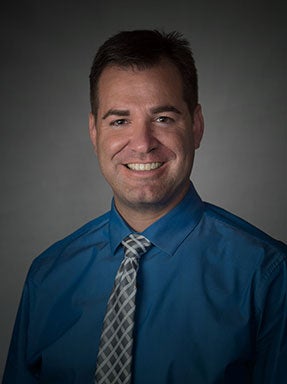DU Alumna Helps Those With Spinal Cord Injuries
Chanda Hinton Leichtle draws from life experiences as she aids others
“I have the best job ever. Every day I get to see that we are changing people’s lives and not everybody gets a job where that’s what they feel every day.”
Changing lives is not something Chanda Hinton Leichtle might be doing today had her own life not suddenly changed when she was only 9 years old. She was accidentally shot in the neck by a teenage boy and left with a severed spinal cord and paralysis below the chest. She learned to overcome the injury while growing up in rural Nebraska.
“I was embraced by my friends so deeply, and I was never treated differently,” Hinton Leichtle recalls. “That helped me feel as though I was never the little girl in the wheelchair; I was Chanda.”
After graduating from high school, Hinton Leichtle wanted to move to a bigger city so she could tap into a wider array of resources that would allow her to be more independent and to attend college. Coming to the University of Denver became an obvious choice for her for two reasons: first, her older sister was living and working in Denver; second, DU’s Disability Service Program offered invaluable assistance.
“I didn’t have to navigate the college experience without having an advocate around extra testing time or showing up to a class that was not accessible,” she says. “They did a lot of that checking prior to me having to show up.”
Hinton Leichtle majored in communication studies and was on pace to graduate in four years, until she suffered a medical setback that nearly killed her. At age 21, she started experiencing chronic pain, one of several secondary conditions resulting from her spinal cord injury. Doctors now added a high dose of Percocet to the other medications she was taking, In turn, that created other complications that left her bed-bound and not eating. Her weight dropped to 59 pounds. The medicine she was taking to save her life nearly killed her, and it was at that point that her sister, who had been studying yoga, suggested alternative treatments such as acupuncture, massage and chiropractic care.
“I believe the integrated therapies absolutely saved my life, and I’m here today because of that,” she says.
It took a fifth year, but in 2005 Hinton Leichtle returned to DU to complete her degree. She decided to focus her efforts on others who are suffering and created the Chanda Plan Foundation.
“I started hearing from other people having the same experience that I was having,” she says. “I knew in that moment that I needed to start an organization that allowed these integrated therapies to be accessible to other people.”
Now more than a decade later, Hinton Leichtle helps hundreds of people each year find the alternative therapies that will help them live with their spinal injuries. She has worked tirelessly with lawmakers to find funding. And earlier this month she opened a new 6,000-square-foot facility in Lakewood to offer the integrated therapies for those in need.
“This is the place where individuals with physical disabilities can come and get all their needs under one roof,” she says. “Everything we do is collaborative versus competitive; it’s all proactive, and its very therapeutic versus medical filling.”
Whether she’s interacting with patients, working with lawmakers, or negotiating with Medicaid, Hinton Leichtle says she draws upon the lessons learned in her communication classes. Last month she was honored by the Denver Business Journal as a 40 under 40 award winner. She is proud of everything she has accomplished, but also believes the credit goes to those who have helped execute her vision.
“It feels really good that I am able to accomplish what I’ve created, but I also look at it like I’m representing and diversifying the way those awards are seen by other members of the community,” Hinton Leichtle says. “I came up with a concept, yet the community and our donors and the foundation and people that give are the people that really make it happen.”









